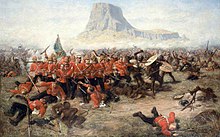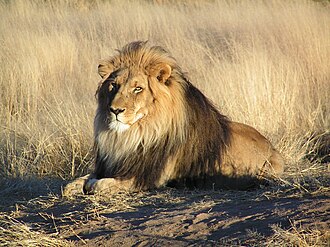Portal:Africa



Africa is the world's second-largest and second-most populous continent after Asia. At about 30.3 million km2 (11.7 million square miles) including adjacent islands, it covers 20% of Earth's land area and 6% of its total surface area. With nearly 1.4 billion people as of 2021, it accounts for about 18% of the world's human population. Africa's population is the youngest among all the continents; the median age in 2012 was 19.7, when the worldwide median age was 30.4. Based on 2024 projections, Africa's population will exceed 3.8 billion people by 2100. Africa is the least wealthy inhabited continent per capita and second-least wealthy by total wealth, ahead of Oceania. Scholars have attributed this to different factors including geography, climate, corruption, colonialism, the Cold War, and neocolonialism. Despite this low concentration of wealth, recent economic expansion and a large and young population make Africa an important economic market in the broader global context, and Africa has a large quantity of natural resources.
Africa is highly biodiverse; it is the continent with the largest number of megafauna species, as it was least affected by the extinction of the Pleistocene megafauna. However, Africa is also heavily affected by a wide range of environmental issues, including desertification, deforestation, water scarcity, and pollution. These entrenched environmental concerns are expected to worsen as climate change impacts Africa. The UN Intergovernmental Panel on Climate Change has identified Africa as the continent most vulnerable to climate change.
The history of Africa is long, complex, and varied, and has often been under-appreciated by the global historical community. In African societies the oral word is revered, and they have generally recorded their history via oral tradition, which has led anthropologists to term them "oral civilisations", contrasted with "literate civilisations" which pride the written word. African culture is rich and diverse both within and between the continent's regions, encompassing art, cuisine, music and dance, religion, and dress.
Africa, particularly Eastern Africa, is widely accepted to be the place of origin of humans and the Hominidae clade, also known as the great apes. The earliest hominids and their ancestors have been dated to around 7 million years ago, and Homo sapiens (modern human) are believed to have originated in Africa 350,000 to 260,000 years ago. In the 4th and 3rd millennia BCE Ancient Egypt, Kerma, Punt, and the Tichitt Tradition emerged in North, East and West Africa, while from 3000 BCE to 500 CE the Bantu expansion swept from modern-day Cameroon through Central, East, and Southern Africa, displacing or absorbing groups such as the Khoisan and Pygmies. Some African empires include Wagadu, Mali, Songhai, Sokoto, Ife, Benin, Asante, the Fatimids, Almoravids, Almohads, Ayyubids, Mamluks, Kongo, Mwene Muji, Luba, Lunda, Kitara, Aksum, Ethiopia, Adal, Ajuran, Kilwa, Sakalava, Imerina, Maravi, Mutapa, Rozvi, Mthwakazi, and Zulu. Despite the predominance of states, many societies were heterarchical and stateless. Slave trades created various diasporas, especially in the Americas. From the late 19th century to early 20th century, driven by the Second Industrial Revolution, most of Africa was rapidly conquered and colonised by European nations, save for Ethiopia and Liberia. European rule had significant impacts on Africa's societies, and colonies were maintained for the purpose of economic exploitation and extraction of natural resources. Most present states emerged from a process of decolonisation following World War II, and established the Organisation of African Unity in 1963, the predecessor to the African Union. The nascent countries decided to keep their colonial borders, with traditional power structures used in governance to varying degrees. (Full article...)
Selected article –
The Battle of Isandlwana (alternative spelling: Isandhlwana) on 22 January 1879 was the first major encounter in the Anglo-Zulu War between the British Empire and the Zulu Kingdom. Eleven days after the British invaded Zululand in Southern Africa, a Zulu force of some 20,000 warriors attacked a portion of the British main column consisting of approximately 1,800 British, colonial and native troops with approximately 350 civilians. The Zulus were equipped mainly with the traditional assegai iron spears and cow-hide shields, but also had a number of muskets and antiquated rifles.
The British and colonial troops were armed with the modern Martini–Henry breechloading rifle and two 7-pounder mountain guns deployed as field guns, as well as a Hale rocket battery. The Zulus had a vast disadvantage in weapons technology, but they greatly outnumbered the British and ultimately overwhelmed them, killing over 1,300 troops, including all those out on the forward firing line. The British were unprepared for the attack from the large Zulu contingent, which had moved quickly, and were attacked along the flanks by the Zulus using their traditional 'horns and chest of the buffalo' formation. The Zulu army suffered anywhere from 1,000 to 3,000 killed. (Full article...)
Featured pictures –
Did you know (auto-generated) -

- ... that nursing educator Helen Turner Watson was one of the first African-American women to become a commissioned officer in the United States Navy?
- ... that the son of an engine fitter from England became Director of Education in part of modern-day South Africa for almost twenty years?
- ... that The Red Moon was the first Broadway show to depict alliances between African Americans and Native Americans?
- ... that after Benjamin Moloise's execution, the extremist group Direct Action bombed two Paris companies linked to South Africa in protest?
- ... that Malabo Mosque cost about two billion Central African CFA francs to build?
- ... that the pulse stops during the soliloquy of In C Mali?
Categories
Selected biography –
David Lekuta Rudisha, MBS (born 17 December 1988) is a retired Kenyan middle-distance runner who is the world and Olympic record holder in the 800 metres. Rudisha won gold medals in the 800 m at the 2012 London and 2016 Rio Olympic Games, where, at the former, he set the world record in the event with a time of 1:40.91. He is also a two-time World champion (2011 and 2015) and two-time Diamond League champion (2010 and 2011) in the 800 m. Rudisha is the first and only person to ever run 800 m under 1:41, and he holds the three fastest times ever run in this event, each being a world record when set.
Rudisha established his running career at the St. Francis Kimuron High School in Elgeyo-Marakwet County. He won 800 m titles at the 2006 World Junior Championships as well as the 2008 and 2010 African Championships, and earned the 2014 Commonwealth Games silver medal. He also holds the world's best time in the 500 metres and the African best for the 600 metres. He is a two-time Diamond League 800 m winner. Rudisha won the IAAF World Athlete of the Year award in 2010 and three consecutive Track & Field News Athlete of the Year awards. (Full article...)
Selected country –
 |
 |
|

| ||
Tanzania, formally the United Republic of Tanzania (Swahili: Jamhuri ya Muungano wa Tanzania), is a country in East Africa bordered by Kenya and Uganda on the north, Rwanda, Burundi and the Democratic Republic of the Congo on the west, Zambia, Malawi and Mozambique on the south, and the Indian Ocean on the east.
The country is named after Tanganyika, its mainland part, and the Zanzibar islands off its east coast. Tanganyika united with Zanzibar in 1964, forming the United Republic of Tanganyika and Zanzibar, which later the same year was renamed the United Republic of Tanzania. In 1996 government offices were transferred from Dar es Salaam to Dodoma, making Dodoma the country's political capital. Dar es Salaam remains the principal commercial city.
Tanzania is mountainous in the north-east, where Mount Kilimanjaro, Africa's highest peak, is situated. To the north and west are Lake Victoria (Africa's largest lake) and Lake Tanganyika (Africa's deepest lake). Central Tanzania comprises a large plateau, with plains and arable land. The eastern shore is hot and humid, with the island of Zanzibar just offshore. (Read more...)
Selected city –
Alexandria (/ˌælɪɡˈzændriə, -ˈzɑːn-/ AL-ig-ZA(H)N-dree-ə; Arabic: الإسكندرية;) is the second largest city in Egypt and the largest city on the Mediterranean coast. It lies at the western edge of the Nile River delta. Founded in 331 BC by Alexander the Great, Alexandria grew rapidly and became a major centre of Hellenic civilisation, eventually replacing Memphis, in present-day Greater Cairo, as Egypt's capital. Called the "Bride of the Mediterranean" and "Pearl of the Mediterranean Coast" internationally, Alexandria is a popular tourist destination and an important industrial centre due to its natural gas and oil pipelines from Suez.
The city extends about 40 km (25 mi) along the northern coast of Egypt and is the largest city on the Mediterranean, the second-largest in Egypt (after Cairo), the fourth-largest city in the Arab world, the ninth-largest city in Africa, and the ninth-largest urban area in Africa. (Full article...)
In the news
- 10 April 2025 – Land reform in Zimbabwe
- Zimbabwe begins issuing the first financial compensation payments to White Zimbabwean farmers whose farms were seized by Robert Mugabe's government between 2000 and 2002. A total of 740 farmers will be compensated as per the 2020 agreement with the Commercial Farmers' Union. (BBC News)
- 8 April 2025 –
- The death toll from the heavy flooding in Kinshasa, Democratic Republic of the Congo, caused by overflow of the Ndjili River increases to 33 deaths. Hundreds of buildings are completely submerged and thousands of people are trapped in their homes. (NPR) (DW)
- About 50 hippos are killed by anthrax poisoning at Virunga National Park in the Democratic Republic of the Congo. (CTV News)
- 8 April 2025 – 2024 Democratic Republic of the Congo coup attempt, Democratic Republic of the Congo–United States relations
- Three U.S. citizens have their sentences for attempting a coup against the Congolese President Félix Tshisekedi in 2024 commuted and are extradited back to the United States. They were previously sentenced to death along with 34 others for the failed attempt that killed six people, including the coup's leader Christian Malanga. (NPR)
- 7 April 2025 – Herder–farmer conflicts in Nigeria
- The National Emergency Management Agency reports that at least 52 people have been killed and over 2,000 others have been displaced from their homes in recent days in tit for tat attacks by rival herders over control of arable land in Plateau State, Nigeria. (Reuters)
- 7 April 2025 – Algeria–Mali relations
- Algeria bans flights to and from Mali in response to "recurrent violations" of Algerian airspace by Malian military drones. (Reuters)
Updated: 5:05, 12 April 2025
General images -
Africa topics
More did you know –
- ...that members of the Senegalese rap group Daara J were hired by campaigners in the Senegalese election of 2000 to edit their speeches?
- ...that Senegalese hip hop group Positive Black Soul's name abbreviation, PBS, is a play on that of the Parti Démocratique Sénégalais, PDS?
- ...that Mamadou Diabaté, a Malian kora player, was nominated for a Grammy Award in 2005, but lost to his cousin Toumani Diabaté?
- ...that, in November 2007, The Sowetan published an article which erroneously claimed that South African political activist Dan Mokonyane had died?
Related portals
Major Religions in Africa
North Africa
West Africa
Central Africa
East Africa
Southern Africa
Associated Wikimedia
The following Wikimedia Foundation sister projects provide more on this subject:
-
Commons
Free media repository -
Wikibooks
Free textbooks and manuals -
Wikidata
Free knowledge base -
Wikinews
Free-content news -
Wikiquote
Collection of quotations -
Wikisource
Free-content library -
Wikispecies
Directory of species -
Wikiversity
Free learning tools -
Wikivoyage
Free travel guide -
Wiktionary
Dictionary and thesaurus




























































































